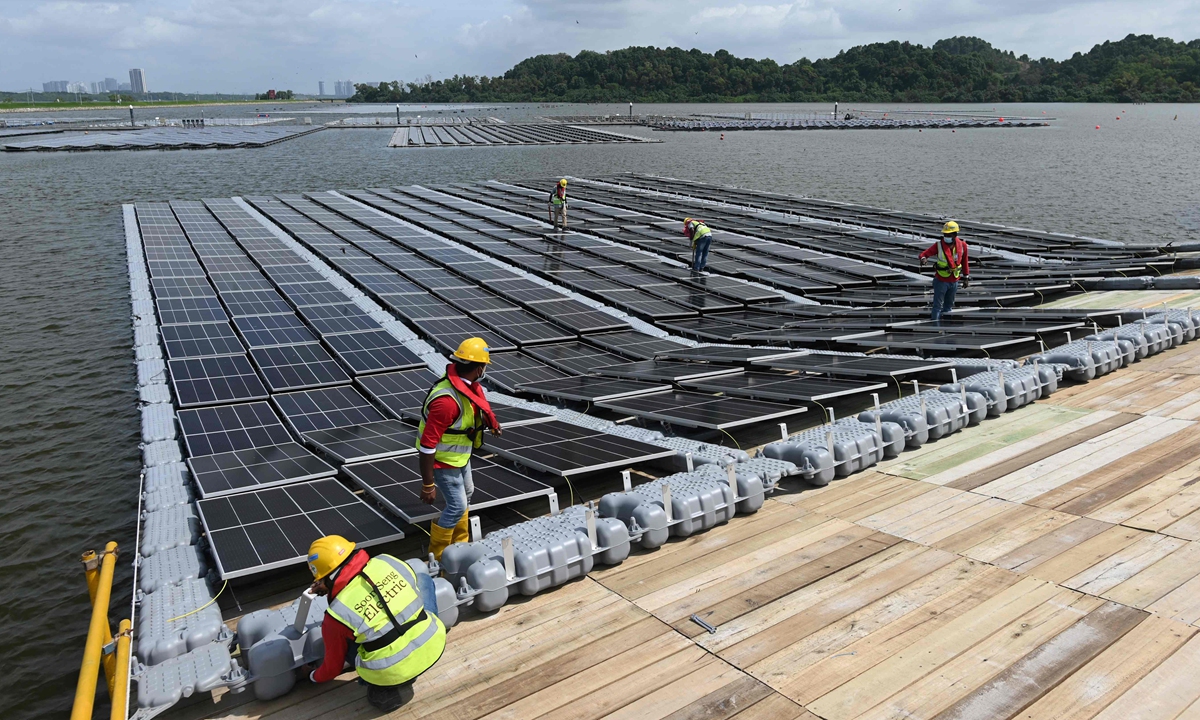Green sustainable initiatives could create millions of new jobs by 2030
Invest in low-carbon cities to protect climate
More COVID-19 recovery spending and public investment is needed for green transport and clean energy in cities, to create jobs, cut planet-heating emissions and limit the damage from climate change, UN officials and researchers said on Wednesday.

The report found that countries including Brazil, Mexico and South Africa - which account for a third of global GDP and about 40 percent of the world's urban population - could cut annual emissions in key urban sectors by up to 96 percent more than current plans by 2050, by investing in low-carbon initiatives. Those include retrofitting old buildings to save on energy use, building new energy-efficient homes with rooftop solar panels, and ensuring affordable housing for the poor is connected to public transport.
Mobility must be made cleaner by expanding fleets of electric buses and adding walking and biking lanes, while cities should recycle more materials and waste, the report said.
Governments also need to help cities protect and restore peatland and mangrove ecosystems in and around them, to curb the risk of flooding and coastal storm surges, it added.
Implementing such measures could bring $12 trillion in net benefits, based on cost savings alone, by 2050 and create millions of new jobs by 2030 - including 500,000 in Mexico, 8 million in India and 15 million in China, it said.
UN Deputy Secretary-General Amina J. Mohammed told the online report launch that carbon-neutral, climate-resilient and inclusive cities are essential "to overcome the climate crisis."
Yet only 14 percent - $2 trillion - of total pandemic stimulus spent in the G20 and 10 other major economies has gone to the energy, transport and waste sectors where cities are best-positioned to implement low-carbon initiatives, the report said. Less than a third, $544 billion, of that stimulus was green. "It is time to do better," the report added.
UN scientists have said global emissions must fall by about 45 percent by 2030 from 2010 levels to give the world a good chance of limiting the rise in average temperatures to 1.5 C above preindustrial times. "Unfortunately current commitments are nowhere near close to what is needed to achieve these targets," Mohammed said. "Carbon dioxide levels are at record highs and extreme wildfires, cyclones, floods and droughts are the new normal."
She urged governments to work with city leaders "to unlock the enormous potential in cities" to cut carbon emissions from energy, transport and construction.
UN climate chief Patricia Espinosa noted that cities in the six countries examined in the report produce about 40 percent of global emissions, but finance was lacking in such nations for low-carbon projects and helping residents, especially the poor, cope better with more extreme weather and rising seas.
By 2030, trillions of dollars will be invested in urban infrastructure.

Workers assembling solar panels on the shore of the Tengeh reservoir as part of the constuction of a floating solar power farm in Singapore on February 3, 2021. Photo: VCG
A report by the Coalition for Urban Transitions, a group of research organizations pushing for more sustainable cities, assessed climate-friendly measures governments and city leaders should prioritize in six emerging economies.The report found that countries including Brazil, Mexico and South Africa - which account for a third of global GDP and about 40 percent of the world's urban population - could cut annual emissions in key urban sectors by up to 96 percent more than current plans by 2050, by investing in low-carbon initiatives. Those include retrofitting old buildings to save on energy use, building new energy-efficient homes with rooftop solar panels, and ensuring affordable housing for the poor is connected to public transport.
Mobility must be made cleaner by expanding fleets of electric buses and adding walking and biking lanes, while cities should recycle more materials and waste, the report said.
Governments also need to help cities protect and restore peatland and mangrove ecosystems in and around them, to curb the risk of flooding and coastal storm surges, it added.
Implementing such measures could bring $12 trillion in net benefits, based on cost savings alone, by 2050 and create millions of new jobs by 2030 - including 500,000 in Mexico, 8 million in India and 15 million in China, it said.
UN Deputy Secretary-General Amina J. Mohammed told the online report launch that carbon-neutral, climate-resilient and inclusive cities are essential "to overcome the climate crisis."
Yet only 14 percent - $2 trillion - of total pandemic stimulus spent in the G20 and 10 other major economies has gone to the energy, transport and waste sectors where cities are best-positioned to implement low-carbon initiatives, the report said. Less than a third, $544 billion, of that stimulus was green. "It is time to do better," the report added.
UN scientists have said global emissions must fall by about 45 percent by 2030 from 2010 levels to give the world a good chance of limiting the rise in average temperatures to 1.5 C above preindustrial times. "Unfortunately current commitments are nowhere near close to what is needed to achieve these targets," Mohammed said. "Carbon dioxide levels are at record highs and extreme wildfires, cyclones, floods and droughts are the new normal."
She urged governments to work with city leaders "to unlock the enormous potential in cities" to cut carbon emissions from energy, transport and construction.
UN climate chief Patricia Espinosa noted that cities in the six countries examined in the report produce about 40 percent of global emissions, but finance was lacking in such nations for low-carbon projects and helping residents, especially the poor, cope better with more extreme weather and rising seas.
By 2030, trillions of dollars will be invested in urban infrastructure.



